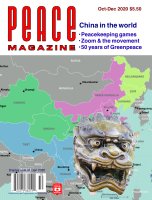
Peace Magazine Oct-Dec 2020, page 23. Some rights reserved.
Search for other articles by Michaela Ehring here
“Whether from climate change, financial crises or, more recently, the corona crisis, in a globalized world, political challenges are increasingly crossing previous boundaries. What happens in a market in Wuhan, China can result in deaths in Mannheim [mid-size city in Germany]; what is going on in the Brazilian jungle can change the climate in Chemnitz. Because no state alone can stop global warming or a pandemic, increasing cooperation is needed. Actually.”
—Der Spiegel, July 12, 2020
Last week I read an article (in German) on spiegel.de, a magazine I consult almost daily. And I made a discovery: there is actually an organization of the mayors of the world. It is the brainchild of Benjamin Barber, Harvard- and LSE-educated political theorist and author.
He said once (in an interview with the Spiegel): “Urban systems stand for the pragmatic solution of problems—they are not burdened by ideologies. Buses just have to drive, the rubbish has to be collected, we need schools and a sewer system. In big cities there is an enormous amount of institutional, social, and technological competence.” I am advocating for a multiplication of this competency.
Currently, the Global Parliament of Mayors has only 50 members, among them those of Amsterdam, Dakar, Kandahar and Atlanta. It is a fairly young organization, but its importance will increase as more cities join and more people and leaders become aware of it.
Democracy happens in its most immediate and unadulterated form at the grassroots level… and the next step up is the municipality / city. We have so-called town halls to discuss all kinds of issues that affect the local and regional community. But as we have argued about the problems in the age of globalization, the topics that we need to discuss and the matters that we have to pay attention to, are similar all over the world. Whether public health issues, flooding, or other natural disasters (think of New Orleans), social consequences of regional economic downturn (Detroit, Alberta cities), housing, energy—these are all local issues that eventually have to been seen in a wider context.
While nowadays many world leaders treat their office like some chieftain in their own feudal realm, mayors around the world have had to “think global and act local” in dealing with their immediate challenges. One example can be found in the community of US mayors who still pledge to follow the Paris Climate Accord, despite their national leader choosing to leave the treaty.
In Barber’s 2014 book If Mayors Ruled the World: Dysfunctional Nations, Rising Cities he proposes the Global Parliament of Mayors, a global governance platform that brings together collective urban political power.
Whether the mayor of Manaus, the leader of a city of two million in the Amazon area badly affected by Covid and directly affected by illegal logging long before that, confronts his national presidentís refusal to act responsibly, or the mayor of Warsaw most recently challenges the president of Poland to provide more democratic leadership, mayors do have significant roles to play.
They can act (especially in concert) as a countervailing power to populist national leaders who do not have the best interest of the population in mind, but just their own cravings for personal power.
Mayors of cities represent the largest swaths of the population worldwide and should be heard before the heads of states and federal governments make decisions that could affect these cities and their inhabitants.
Big cities were the first to be impacted by the pandemic, so it is appropriate for their mayors to consult each other. And of course, in terms of nuclear safety (nuclear power or weapons plants near big cities) as well as the economic consequences of national policies for their communities, mayors are uniquely positioned to tackle the issues head-on.
Reading Barberís book and putting his suggestions into practice in more places around the world, offers a practical approach to many of the daily challenges that communities face everywhere around this globe. Letís do it.
Michaela Ehring teaches English and German as a second language and serves on Peace_ís editorial committee. For more on the parliament of mayors, see: https://globalparliamentofmayors.org/faqs/

Peace Magazine Oct-Dec 2020, page 23. Some rights reserved.
Search for other articles by Michaela Ehring here